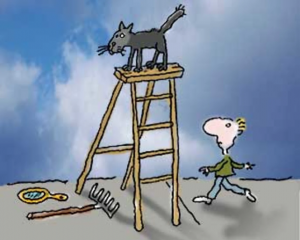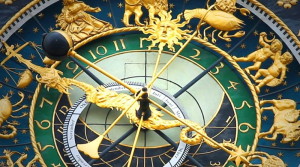A man woke up, walked down the hall, and found himself accidentally breaking a mirror. He then walked under a ladder in a crowded street and ran across a few black cats. At the end of the day, he entered a hotel and was put in room thirteen. He then realized that it all happened on Friday the Thirteenth. All of these “signs” are superstitions — belief in unjustified supernatural forces. Is there science behind any of these? Surprisingly, yes, but that doesn’t mean they are proven to be real.
Psychologists have concluded that superstitions come from co-occurring but non-related events. None of them are actually true, but they can help with difficult moments. For many people, following superstitions decreases their anxiety. This proves why superstition levels increase when the stress level of the general public increases. During economic, political, or social depressions, more superstitions are observed. For example, in Germany between 1918 and 1940, levels of superstition were high, correlated with the amount of economic stress.
ASTROLOGY
Astrology is a significant belief that many people trust during personal growth. It gives predictions and explanations for earthly events using rules about the relative positions and movements of heavenly bodies. “What’s your zodiac sign?” is one of the most commonly asked questions during first encounters with new people. 75% of the population read their horoscope, but only 25% believe in it. Is it superstition? The general scientific community might say yes, but professional astrologers might disagree.
Astrology is very much scientific in its own way. For example, it focuses on explaining the natural world. It uses observable pieces of evidence, such as the movement of stars, to formulate hypotheses. If astrology is used to generate specific expectations, then it is able to be tested, making it a step closer to being scientific. For example, a person born just after the spring equinox is believed to be more likely to become an entrepreneur. This can be tested through observations about social trends and information can be gathered through the birth information of entrepreneurs. Nevertheless, there is proof that astrology is not quite scientific. After the information is gathered, evidence might prove against commonly believed astrology patterns. Astrology has not changed its ideas for years, if not decades, which shows that it does not follow the path of scientific processes. There is also no evidence of astrology contributing to new scientific discoveries. There is no fair, scientific way of gathering evidence except for experiences reported by people. The astrological community often ignores evidence that is contradictory.
Whether astrology is real or not, people still subconsciously keep an image of what they know about the topic and apply it to real life. Just like other forms of superstitions, it provides people with a sense of security when things are “supposed” to work out.
ARE SUPERSTITIONS BENEFICIAL?
Believing in superstitions can certainly change how we go about our lives. For example, on Friday the 13th, businesses tend to suffer the most losses and airlines lose the most business. $800 or $900 million is estimated to be lost in U.S. business on Friday the 13th. However, all of these are due to the belief in bad luck on this day. There is actually no evidence regarding whether there’s actually bad luck since there’s no increase in hospital visits, accidents, or natural disasters on Friday the 13ths.
Then why do people still believe in superstitions? Superstitious people generally defend their beliefs by saying that there’s nothing to lose. It can increase the feeling that you’re in control, making you feel like you improved your life by doing practically nothing. It is fun to believe in something that’s magical and distract oneself from the cold truths that occur in life. With the sense of security gained, things might actually go better. However, if someone gets too caught up in superstitions, they can become passive and wait for divine intervention about things that they should take action on.
We live in a world that is becoming more and more scientific, with new research happening every day. People still use superstitions from decades ago to deal with problems. The science world doesn’t know whether that brings a positive or negative influence on one’s life. The next time you avoid going under a ladder or ask for someone’s zodiac sign, think about this: “Life is pretty scary sometimes, so people do whatever they can to try to avoid hidden dangers.”
Works Cited:
- Armah. “Superstitions: What Are They and Why Do We Believe in Them?” Psychology Opinions, 16 Sept. 2022, psychologyopinions.com/superstitions-what-are-they-why-do-we-believe-in-them.
- “Astrology: Is It Scientific? – Understanding Science.” Understanding Science – How Science REALLY Works…, 22 Aug. 2022, https://undsci.berkeley.edu/astrology-is-it-scientific/.
- Sciencegeo. “Is Astrology Science?” ScienceGeo, 12 July 2020, sciencegeo.com/is-astrology-science/. Accessed 14 Feb. 2023.
- “Why Do People Believe in Superstitions?” Exemplore, 31 Mar. 2022, https://exemplore.com/legends/What-are-Superstitions.
- Pappas, Stephanie. “Thirteen Common (but Silly) Superstitions to Savor.” NBC News, 13 Jan. 2012, www.nbcnews.com/id/wbna45988346.
This column was submitted by high school student Iris Wang. Student STEM Columns are submitted by high school or advanced middle school students who wish to share their passion for STEM. Students interested in submitting a column should email us at info@areteem.org.
Share this post!
